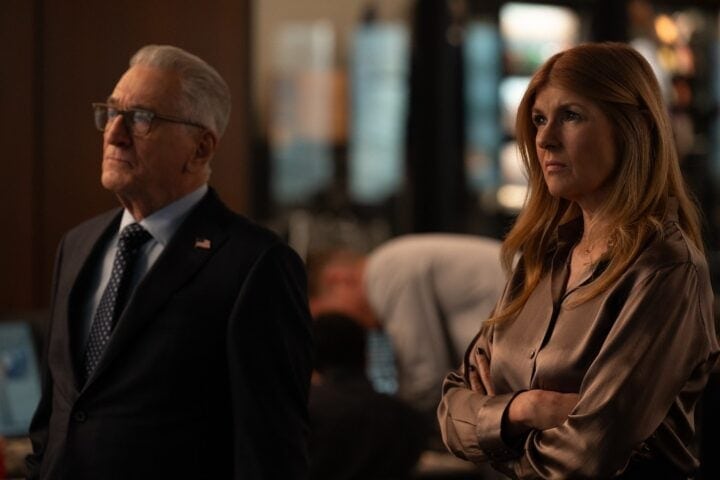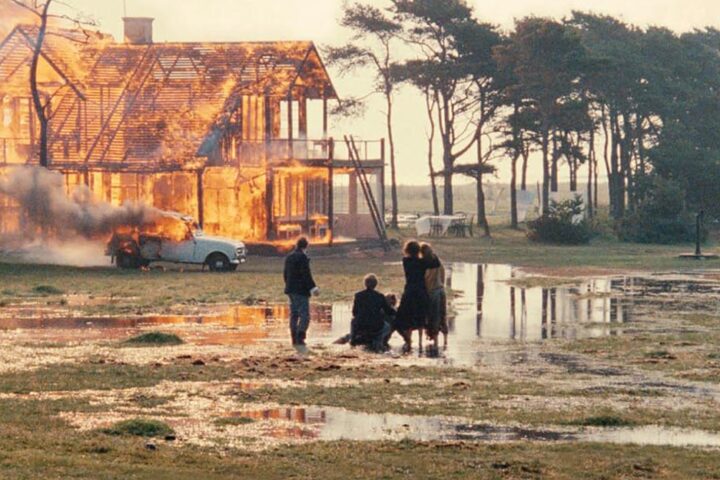Criterion’s 15-disc set The Complete Films of Agnès Varda is a boon to cinephiles, and it will likely go down as the home-video release of the year. Dividing Agnès Varda’s entire filmography across 15 themed “programs,” the set begins with “Agnès Forever” (featuring her end-of-life retrospective Varda by Agnès, which premiered at the 2019 Berlinale just a month before her death at 91), before then commemorating her films made “Around Paris” (between 1958 and 1986), her two periods making films “In America” (featuring shorts and features made between 1968 and 1981), and the many faces, places, and visual ideas that fascinated the French filmmaking giant throughout her career.
In addition to providing an illustrative framework for her cinema, this comprehensive collection provides a treasure trove of new, high-quality restorations and transfers of films that were previously difficult to see, especially in the United States. Some highlights include the visually stunning shorts Ô saisons, ô château and Du côté de la côte, both commissioned for French TV in the late 1950s; two deeply humane documents of life in Paris and Los Angeles, Daguerréotypes and Mur Murs, respectively; Jacquot de Nantes and The World of Jacques Demy, loving odes to her departed filmmaker husband; and a bevy of other shorts and features.
Varda was one of the only female filmmakers associated with the French New Wave, which for generations of critics and artists was the cinema. Rebellious and intellectually engaged, formally playful but serious-minded, this movement that gestated among the young cinephiles of postwar France augured not only the revitalization of film as an art form, but arguably the cultural revolution of the ’60s. For a long time, the early features of erstwhile Cahiers du Cinéma critics François Truffaut and Jean-Luc Godard, made around 1958, were considered to represent the birth of the French New Wave. Even at the time, though, Godard, Truffaut, and their peers recognized an earlier film as the spiritual predecessor to their work: 1955’s La Pointe Courte, which Varda had written, directed, and produced independently and without any filmmaking experience—a feat almost inconceivable in the French film industry at the time, particularly for a woman.
Varda was only four years older than Truffaut, the youngest of the French New Wave’s Young Turks, but that didn’t stop them from dubbing her the “grandmother of the New Wave”—an appellation meant as a token of respect, but which also implied that her best work was behind her, that her purpose had been to foster the work of her male contemporaries. In truth, Varda was still at the start of a fruitful career, sharing the spotlight at the head of the French New Wave’s more political- and literary-minded offshoot, the Left Bank. Her first masterpiece, Cléo from 5 to 7, a real-time look at a pop singer facing the possibility of her mortality, was released in 1961 and was followed by almost 60 years of steadfastly independent, thought-provoking art.
Varda used cinécriture (cinema plus écriture, or writing) to describe her work—recalling critic Alexandre Astruc’s 1948 coinage of the term “camera-stylo” (or camera-pen)—and made cinema that was often personal and poetic, a form of reverie that fused the real world recorded by the camera with her musings and daydreams. La Pointe Courte stands as one of the keys to understanding her oeuvre as a whole. Its juxtaposition of a highly mannered romantic drama with neorealist vignettes of fishermen and their families—which earned high acclaim from reality-junkie André Bazin—already exhibits her abiding interest in the tension between the world as it is given to us and as we order it through our thoughts, memories, and fictions.
Another likely point of entry to Varda’s cinema is the essay film that defined her late period, The Gleaners and I, from 2000. This diaristic documentary sees the newly septuagenarian filmmaker experimenting with the portability of late-’90s digital cameras. We join her as she travels through the French countryside and cities to discover the vestiges of gleaning, the practice of gathering the leftovers of a year’s harvest from the field. Varda saw in gleaning a metaphor for her approach to film form as collage (or décollage, as a well-known, digitally artifacted close-up of her face evokes), engrossing viewers in an exploration of the relationship between art and life, nature and what we make of it—emblematized by the symbol of one of her hands filming the other, as well as the heart-shaped mutant potatoes left lying in the field for gleaners to collect.
In the end, what unites the films in Varda’s canon is her boundless curiosity: As she modestly asserts in 2002’s The Gleaners and I: Two Years Later, she enjoys filming people, and “I also enjoy filming potatoes, life going by, and cats.” It’s an attitude easily mistaken for naïveté, but the way that Varda is able to join a celebration of the world with a distinctly left-humanist, feminist political perspective is almost miraculous—most saliently on display in films like The Gleaners and I, the 1968 short Black Panthers, 1977’s One Sings, the Other Doesn’t, and 2017’s Faces Places (co-directed with photographer and street artist JR) but present throughout her work.
This facility for combining the appreciation for beauty with social and ethical concern may be the hallmark of Varda’s cinécriture. Her films teach us how to experience wonder at the world while at the same time recognize its shortcomings, to balance our awareness of injustice with delight in the majesty of potatoes, murals, beaches, houses, mazes, clocks, trinkets, children, love, humans, time, and cats. Few filmmakers have realized with more care, generosity, or freedom the varied potentials of the cinema.
Image/Sound
The 39 shorts and features included here all boast impeccable image tracks that maintain the qualities and textures of the formats that Agnès Varda worked with, from the super-saturated colors of Le Bonheur, to the more muted tones of ’70s and ’80s work like Daguerréotypes and Documenteur. The pre-digital films exhibit pleasant grain levels, adding texture and warmth to the images. All the films have been restored in 2K and 4K from archival sources, but in 1080p there’s little appreciable difference in quality between, say, the 4K-sourced Black Panthers and the 2K-sourced Le Bonheur. Most of the films also feature remarkably clear soundtracks, with even the older, monaural ones free of noticeable popping, fuzziness, or other defects. This is particularly notable in the case 1966’s The Creatures, which had never before been digitized for home-video release and has a distinctive modernist score by Pierre Barbaud, composed using cards fed into a primitive computer.
Extras
Unlike prior monster Criterion auteur collections like AK 100: 25 Films by Kurosawa, The Complete Films of Agnès Varda is brimming over with special features. For prior home-video releases of much of her work, Varda filmed introductions and addendums at her home and editing studio on Paris’s Rue Daguerre between 2002 and 2012, all of which are included here. Archival interviews with Varda while she was working on films like Le Bonheur and The Creatures are complemented by retrospectives with actors who appeared in the films, often arranged by Varda herself. The most notable newer features produced or sourced by Criterion include a talk at the 2019 Telluride Film Festival that includes Varda’s children, Rosalie Varda and Mathieu Demy, and Martin Scorsese, in which the latter reveals his decades-long, surprisingly close friendship with the matriarch of the French New Wave; an extended interview with Jane Birkin, the actress and model whose fast friendship with Varda inspired the films Jane B. par Agnès V. and Kung Fu Master!; and a video essay about Michel Legrand’s score for Cléo from 5 to 7 by Every Frame a Painting creator Tony Zhou.
Perhaps the most breathtaking extra included in this mammoth set is the accompanying “booklet” that, at 198 pages, constitutes a full-size anthology on Varda’s work, with five essays on her work, extensive notes accompanying each program, and a selection of photographs from throughout Varda’s lifelong parallel career as a photographer and visual artist. Especially noteworthy are Amy Taubin’s introduction, an admiring tribute to the multifaceted Varda, and film scholar Ginette Vincendeau’s “A Woman’s Truth,” which contextualizes Varda’s feminism within the historical currents she lived in. Michael Koresky’s program notes are acutely observed and, taken as a whole, more than suffice in lieu of audio commentaries for each film.
Overall
The incredible quality and scope of this set makes it one of the most impressive home-video releases of all time. It’s a loving tribute to a film giant, and as good a biography of her as we’ll ever get.
Since 2001, we've brought you uncompromising, candid takes on the world of film, music, television, video games, theater, and more. Independently owned and operated publications like Slant have been hit hard in recent years, but we’re committed to keeping our content free and accessible—meaning no paywalls or fees.
If you like what we do, please consider subscribing to our Patreon or making a donation.




